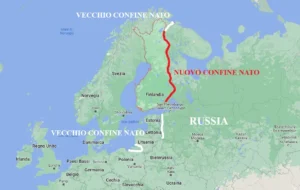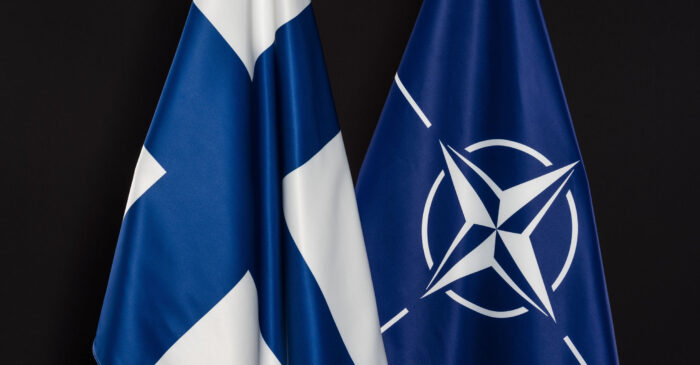(by Andrea Pinto) April 4, 2023 marks a historic date, the Finland is officially a member of the NATO, thus going to increase the borders of the Alliance (another 1340 km) close to the Russia. Even if NATO and Western countries celebrate the day by fueling hopes of entry Sweden ed Ukraine, many believe that this move on the international arena greatly increases the already existing tension with Moscow. Tension that could favor escalation, directly involving the same states of the Alliance in Europe, de facto decreeing the beginning of World War III. Let's not forget that Russia is still a nuclear superpower, second only to the United States of America.

The spokesman for the Kremlin, Dmitry Peskov, to the Russian state news agency, Ria Novosti commented on the news: “Finland's entry into NATO it encroaches on the security of Russia, aggravating the situation. We will be watching closely what happens in Finland, how NATO will exploit Finnish territory in terms of placing weapons and infrastructure systems that will be close to our borders and potentially threaten us. Measures will be taken based on this”.
“The era of military non-alignment in our history is over. Today begins a new era”, was the hot comment of the Finnish president Sauli Niinisto. “Sweden will also soon become a full member of the alliance”, the NATO secretary general promised, Jens Stoltenberg. The US secretary of state Antony blinken he joked thus: “Today we should thank Mr. Putin”.Ukraine's reaction. "NATO and Ukraine need each other“, was the appeal of the Foreign Minister of Kiev, Dmytro kuleba, invited to attend the meeting of allied ministers in Brussels. “We appreciate the alliance's support, but there is no better strategic solution for the security of the Euro-Atlantic region than Ukraine's NATO membership".
Kuleba's presence at the NATO meeting provoked Hungary's reaction. “The invitation of the Ukrainian foreign minister to the meeting of NATO foreign ministers is a violation of NATO unity. Hungary will support Ukraine's integration efforts only if the rights of Hungarians in Transcarpathia are restored."thundered the Hungarian minister Peter Szijjarto.
There is ferment at the diplomatic level to bring the crisis back into the channels of peaceful negotiation. Tomorrow a joint mission Brussels-Paris will go to China. Before the three-way summit and face-to-face with the president Xi, von der Leyen he will meet the head of the Chinese State Council and representatives of the EU-China Chamber of Commerce. In addition to talking about trade, the Chinese 12-point peace plan will be discussed, the only one that actually exists today. Europe is thus trying not to cool relations and dialogue with Xi Jinping, the only one able to actually affect the policy of Vladimir Putin due to the commercial ties that are increasingly thickening between the two countries in an anti-Western function.
But apparently the die is now cast. Finland today, Sweden and maybe even Ukraine tomorrow will be part of NATO creating a new highly unstable curtain in the middle of Europe. The direct consequence is the announced rearms by the major EU countries.La France has announced that in the next seven years it will invest 413 billion euros in defence. The annual budget will go from 32 billion in 2017 to 69 billion, until 2030. The nuclear deterrence will be one of the key cost centers of this budget increase, with the construction of a nuclear powered aircraft carrier new generation. The Macron government also wants to invest in means of cyber, space and submarine defense.
La Poland will increase the Defense budget to 4%, while the Germany will immediately allocate 100 billion euros to the military budget.
Like France, the rest of Europe is also in the throes of an arms race. In Italy it is thought to bring the defense budget to 2% of GDP in response to the 2014 appeal launched by NATO to all allies.
Italy therefore does not want to fall behind. The minimum objective is to increase the budget to be allocated to the Defense sector from at least 1,5 per cent to 2 per cent of GDP, because, in the face of some excellence in the weapon systems of the individual Armed Forces, we are not in capable of dealing with a high-intensity conflict like the one in Ukraine. The problem that has emerged is that the national stockpile of ammunition and armaments is dwindling due to decades of apparent détente after the Cold War. We have invested in excellence while neglecting the sensitive area of recruitment, in the face of an unacceptable increase in the average age of our military personnel, which will reach 46 years by 2024. DiPaola law (L. 244/2012) to bring the army to 144 thousand units by 2024, due to budgetary needs of the time, is no longer current and sustainable.
In a framework that is no longer adequate, it is hoped that Parliament will act immediately with a common and non-political vision because National Security and Defense must not have political colors. The objective is therefore the 2% of GDP promised to NATO in 2014, even if many analysts think it is no longer sufficient and current. Military spending should increase to at least 2,5 percent of GDP in order to achieve an acceptable and resilient defense system.
Italy today spends just over 1,5 of its GDP on defence, for a value of around 18 billion euros a year. Other funds are allocated by the Ministry of Economic Development and the Ministry of Economy and Finance for programs of new weapon systems and missions abroad, thus bringing the total budget to around 25 billion euros a year.
